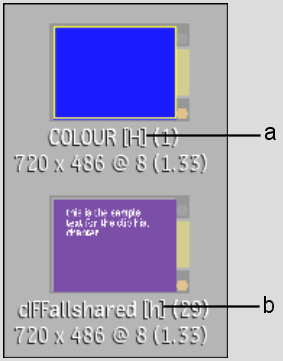Show in Contents

Add to Favorites

Home: Inferno

Clip History

Clip History

Modifying a Clip in its Last Module

About Clip History
The Clip History feature tracks and
updates operations you have applied to a clip or clip segment. It expands the clip, providing
a view of your operations. To easily see all of a clip's operations,
you can display the clip history in the Batch schematic. You can then use the clip history in Batch
as an access point for modifying clips. You can modify a clip at
any point in its history.
Clips that have a clip history contain sources
and intermediates. Sources are any of the original clips used to
build an effect, for example, clips captured using an EDL. Intermediates are clips that are created when
building a clip that uses multiple effects or operations.
There are three ways that you can modify a clip
using its clip history:
- The
simplest way of using clip history is to load a processed clip back
into the last module that was used to create the clip. For instance,
you load a clip into the Colour Corrector, modify the colour, and
process a new clip. You decide that you want to change the colour
slightly, so you double-click the “H” icon of the new clip to go
back into the Colour Corrector with the settings restored. You tweak
the values slightly, and then process another clip (which has its
own clip history).
- If
multiple modules were used to create a clip, you can load them all
into a Batch setup and make modifications at any point in the process
tree. For instance, you may have created a composite by bringing
a colour-corrected back layer into the Master Keyer with a front
and key-in layer that may also have been modified (for example,
with a Flip). By loading the resulting clip into Batch, you can
modify it at any point in the process tree, and then process a new
clip.
- If
you edit together clips to create a clip with soft edits, and at
least one of the clips has clip history, you can modify its segment
in the Batch timeline. With this method, you access the Batch timeline,
select the segment, and then expand it into a Batch process tree.
You can then make changes to any of the nodes or clips. When outputting
these modified clips, you have the choice of processing the entire
clip, or a modified segment only.
If you
expand a clip history with an Action module, only the Action media
that contain clips with history will be expanded. Media without
history are simply loaded as Action media.
Clips with history are indicated by the letter “H”.
Edited soft clips with at least one segment with history are denoted
by “h”.
NoteFor clip history to be created, you need
to enable the Clip History preference in the Preferences menu.


